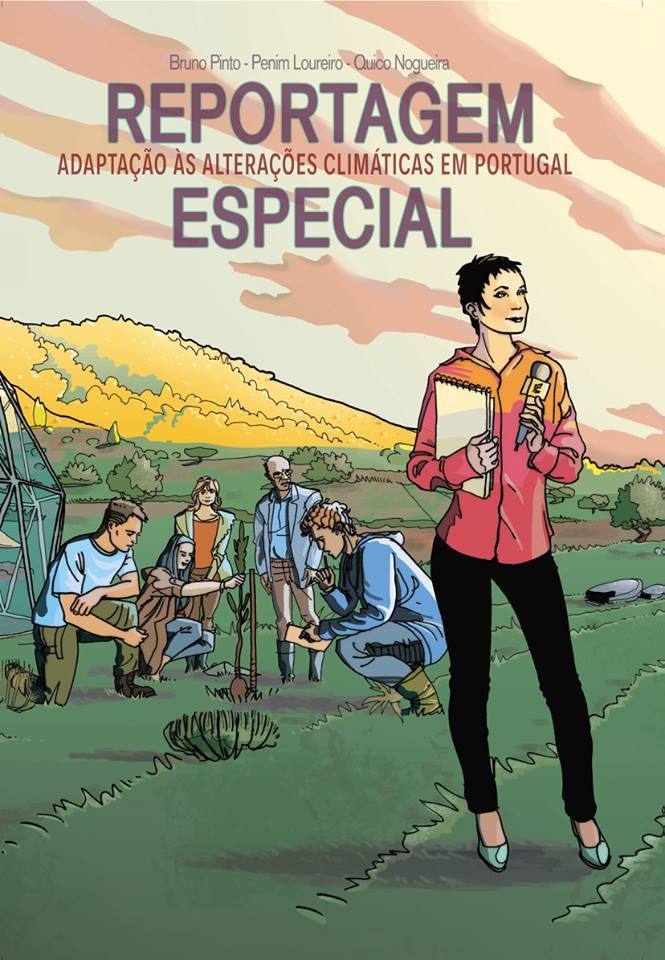Description
In the context of a recent project entitled “ClimAdaPT.Local” (http://climadapt-local.pt/en/) which aimed to promote adaptation to climate change at the municipal level in Portugal, it was decided to create a comic book about this theme, with both digital and paper versions (in Portuguese and English). This was entitled “Special report: adaptation to climate change in Portugal”. The book has about 80 pages in color, with a format close to A4, and is available for download online in pdf format, in either of the two languages.
This comic book was created by Bruno Pinto (writer), Penim Loureiro (drawing) and Quico Nogueira (color). The plot revolves around a stubborn tv journalist that wants to report about climate change in Portugal in the context of the Paris Agreement, and convinces her editor and cameraman to do it. The book invites the reader to follow her path while she reports on adaptation to climate change in Portugal, which includes the findings from the project “ClimAdaPT.Local”. Based on real interviews, the book covers the stories of common citizens affected by sea-level rise and coastal erosion, storms, urban floods, droughts, heat waves, etc. It also presents possible solutions for adaptation through the views of scientists, public officials, and private companies, as well as national and international measures to address the issue of climate change.
Objectives and beneficiaries
The main objectives of this book were to:
1. Provide information in an accessible format to the Portuguese public about causes, consequences and main adaptation measures to climate change. The format of the comic book (in both digital and paper forms), with characters, graphic representations of events and an easy-to-follow plot, aimed to reach audiences which are not familiar with the theme of climate change.
2. Inform about the project “ClimAdaPT.Local”, the major adaptation initiative at the municipal level carried out so far in Portugal. This was directed at the project partners, but also at other stakeholders that have an interest in the adaptation to climate change (e.g. municipalities, NGOs, etc.).
3. To a lesser extent, this book can also inform audiences about climate change in other European countries. This was the main motivation to create an English version of the book.
Strong points of the solution
This comic book presents the theme of climate change in Portugal and in particular the “ClimAdaPT.Local” project in an appealing and innovative way by an easily understandable storyline. It shows the main issues and also some of the possible solutions. Hopefully, this can inspire municipalities and citizens throughout the country to share experiences and learn from each other. This can help to make adaptation to climate change easier and more effective. Moreover, this book can be useful to people outside of Portugal that are interested in climate change adaptation and wish to learn more about it.
Expected results and benefits for climate change adaptation and mitigation
The book was downloaded widely and copies were offered to project partners, as well as to other interested stakeholders. Besides some media attention at the national level (TV channel and daily newspaper), this book featured on the U.N. climate change communication website (http://newsroom.unfccc.int/climate-action/art4climate-comic-art) and on the EEA Grant projects website (https://eeagrants.org/News/2017/An-award-winning-climate-change-project). In 2017, 100 copies were offered to participants in the Climate Kick Summer School in Portugal (http://www.climate-kic.org/). A municipality in the south of Portugal (Loulé) is currently preparing 4000 copies of the book to be distributed in local schools, an international education project is also printing 100 copies to use it (http://www.climact.net/).
We hope that the book will continued to be used in Portugal and other European countries, thus spreading the word about climate change and adaptation.
Scalability potential of the solution
This educational tool could be scalable by the printing of more copies to offer to different institutions both at national and international levels. Although a digital version of a book is always a good way to reach a wider audience, a physical book on paper should have a greater impact. Additionally, a new comic book/animation about climate change at the European level which includes impact and adaptation in Central and Northern Europe could be promoted.
[Editor's Note: All information published as submitted by the author(s). Minor edits may have been made for length and clarity.]







